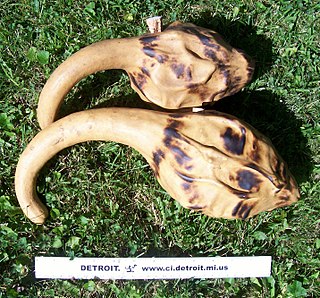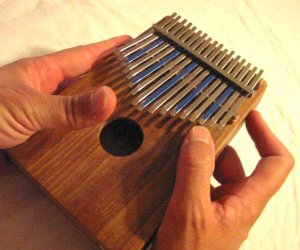
The xylophone is a musical instrument in the percussion family that consists of wooden bars struck by mallets. Like the glockenspiel, the xylophone essentially consists of a set of tuned wooden keys arranged in the fashion of the keyboard of a piano. Each bar is an idiophone tuned to a pitch of a musical scale, whether pentatonic or heptatonic in the case of many African and Asian instruments, diatonic in many western children's instruments, or chromatic for orchestral use.

Mbira are a family of musical instruments, traditional to the Shona people of Zimbabwe. They consist of a wooden board with attached staggered metal tines, played by holding the instrument in the hands and plucking the tines with the thumbs, the right forefinger, and sometimes the left forefinger. Musicologists classify it as a lamellaphone, part of the plucked idiophone family of musical instruments. In Eastern and Southern Africa, there are many kinds of mbira, often accompanied by the hosho, a percussion instrument. It is often an important instrument played at religious ceremonies, weddings, and other social gatherings. The "Art of crafting and playing Mbira/Sansi, the finger-plucking traditional musical instrument in Malawi and Zimbabwe" was added to the UNESCO Representative List of the Intangible Cultural Heritage of Humanity in 2020.
Given the vastness of the African continent, its music is diverse, with regions and nations having many distinct musical traditions. African music includes the genres amapiano, Jùjú, Fuji, Afrobeat, Highlife, Makossa, Kizomba, and others. African music also uses a large variety of instruments across the continent. The music and dance of the African diaspora, formed to varying degrees on African musical traditions, include American music like Dixieland jazz, blues, jazz, and many Caribbean genres, such as calypso and soca. Latin American music genres such as cumbia, salsa music, son cubano, rumba, conga, bomba, samba and zouk were founded on the music of enslaved Africans, and have in turn influenced African popular music.

Zimbabwean music is heavily reliant on the use of instruments such as the mbira, Ngoma drums and hosho. Their music symbolizes much more than a simple rhythm, as the folk and pop style styled music was used as a symbol of hope for Zimbabweans looking to gain independence from Rhodesia. Music has played a significant role in the history of Zimbabwe, from a vital role in the traditional Bira ceremony used to call on ancestral spirits, to protest songs during the struggle for independence. The community in Zimbabwe used music to voice their resistance to their oppression, as one of the only weapons they had available to fight back with. In the eighties, the Music of Zimbabwe was at the center of the African Music scene thanks to genres such as Sungura and Jit. However, several performers were banned by state TV and radio leading to the closing of several music venues.

The hosho are Zimbabwean musical instruments consisting of a pair of maranka (mapudzi) gourds with seeds. They are used as major instruments in many traditional Shona music genres, such as in mbira ensembles and in mhande. They typically contain hota seeds inside them. Before the hota seeds are added, the hosho is boiled in salted water and the inside is scraped out with a corncob, newspaper plug, or woven wire. Removing the debris inside the hosho allows for a more sharp and percussive tone.

A lamellophone is a member of the family of musical instruments that makes its sound by a thin vibrating plate called a lamella or tongue, which is fixed at one end and has the other end free. When the musician depresses the free end of a plate with a finger or fingernail, and then allows the finger to slip off, the released plate vibrates. An instrument may have a single tongue or a series of multiple tongues.
Ephat Mujuru (1950–2001), was a Zimbabwean musician, one of the 20th century's finest players of the mbira, a traditional instrument of the Shona ethnic group of Zimbabwe.
Abraham Dumisani Maraire, known to friends as "Dumi", was a master performer of the mbira, a traditional instrument of the Shona ethnic group of Zimbabwe. He specialized in the form of mbira called nyunga nyunga, as well as the Zimbabwean marimba. He introduced Zimbabwean music to North America, initiating a flourishing of Zimbabwean music in the Pacific Northwest that continues into the 21st century.

The Shona people are an ethnic group native to Southern Africa, primarily living in Zimbabwe where they form the majority of the population, as well as Mozambique, South Africa, and a worldwide diaspora including global celebrities such as Thandiwe Newton. There are five major Shona language/dialect clusters : Karanga, Zezuru, Korekore, Manyika and Ndau.

Stella Chiweshe was a Zimbabwean musician. She was known internationally for her singing and playing of the mbira dzavadzimu, a traditional instrument of the Shona people of Zimbabwe. She was one of few female players, and learned to play from 1966 to 1969, when other women did not.
Chartwell Shorayi Dutiro was a Zimbabwean musician, who started playing mbira when he was four years old at the protected village, Kagande; about two hours drive from Harare, where his family was moved by the Salvation Army missionaries during the Chimurenga. Even though the missionaries had banned traditional music, he learned to play from his brother and other village elders. His mother also encouraged him through her singing of traditional songs.

Forward Kwenda is a mbira performer from Zimbabwe. He was born in the rural Buhera area in Manicaland, an area known for its fierce resistance to colonial rulers and respect for Shona tradition. As a young boy, Forward excelled in traditional dance and recitation of ancient poetry. At the age of 10, he began to play ngoma (drums) and hosho for his mother's gombwe (rain-making) spirit. He was given the name "Forward" because of his curiosity about many subjects, enthusiastic involvement in many activities and his performances for guerrilla forces during the Rhodesian Bush War.

Chiwoniso Maraire was a Zimbabwean singer, songwriter, and exponent of Zimbabwean mbira music. She was the daughter of Zimbabwean mbira master and teacher Dumisani Maraire. Describing the mbira, an instrument traditionally used by male musicians, she said, "It is like a large xylophone. It is everywhere in Africa under different names: sanza, kalimba, etc. For us in Zimbabwe it is the name for many string instruments. There are many kinds of mbiras. The one that I play is called the nyunga nyunga, which means sparkle-sparkle."
Sibusiswe "Busi" Ncube is a female mbira musician and singer from Zimbabwe, who sings in six African languages. She play the guitar, mbira and percussions.

Big Brother Africa 6 was the sixth season of the reality television series Big Brother Africa produced by Endemol for M-Net which began airing on 1 May 2011 and ran for 91 days until 31 July 2011. This year Mnet co-partnered with Coca-Cola for the season. Ikponmwosa "IK" Osakioduwa came back to host the show for the third time in a row. The launch show was also broadcast live through the official website. This year the contestants will move into a brand new house. South African band BLKJKS (Blackjacks) performed their song 'Mzabalazo'; Busta Rhymes also performed during the 2 hour launch show.

Vimbai Mutinhiri is a Zimbabwean actress, model and television personality. She was born in Harare, Zimbabwe but raised in Belgrade, Serbia and in Johannesburg, South Africa. Prior to participating in Big Brother Africa Amplified in 2011, she studied in South Africa graduating from the University of Cape Town with an honours degree in politics, philosophy and economics.

The House of Discarded Dreams is a 2010 fantasy novel by Ekaterina Sedia about a college student who experiences many fairy tales and legends as she finds her place in the world.

John Cole is a Zimbabwean choreographer and performing artist.

Ruvimbo Hope Masike, professionally known as Hope Masike is a Zimbabwean musician and dancer. She is known as "The Princess of Mbira" and her music has its roots both in traditional and modern African culture. Hope is also the lead singer for Monoswezi. She initially studied Fine Art at Harare Polytechnic.













